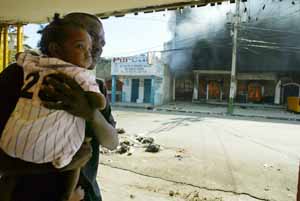


|
|
AP/Ricardo Mazalan
|
|
Man with baby passes by bank set on fire February 29 in Port-au-Prince, Haiti's capital, after President Jean-Bertrand Aristide resigned and was flown into exile.
|
Armed rightist forces in revolt against the government rapidly swept into the capital city of Port-au-Prince, seizing the national police headquarters and other key positions. One rebel leader, Guy Philippe, has declared himself head of Haiti’s military and police, and his forces rampaged through the former army headquarters while U.S. Marines looked on.
Aristide, whose exit was organized by the U.S. State Department, was flown to the Central African Republic. He is reportedly seeking asylum in South Africa.
The rightist groups, led mostly by former army officers, had launched a revolt against the government in early February. They took advantage of Aristide’s diminishing popularity in face of the economic crisis and his reliance on Washington to try to protect his regime.
U.S. officials said they would support Haiti’s Supreme Court chief, Boniface Alexandre, sworn in as president soon after Aristide’s departure. According to the Haitian constitution, Alexandre is supposed to remain in office until elections in 2005.
The advance contingents of foreign troops will be reinforced by an imperialist “peacekeeping” force to be deployed in Haiti under the United Nations banner.
Aristide had called for an “international” police force to intervene to save his regime. But as the rightist forces continued to advance and the Haitian leader acquiesced to demands by Washington and Paris that he “share power,” the very forces he turned to announced that they wanted him to quit.
Speaking the day after his arrival in the Central African Republic, Aristide complained bitterly that he had been overthrown by the U.S. government.
On February 5 right-wing armed groups seized control of Gonaives, the country’s fourth-largest city, and soon took control of more and more cities and towns. By the time of Aristide’s departure, they had taken over a majority of Haitian territory and were preparing a bloody assault on Port-au-Prince.
The armed rebel front includes former army officers and leaders of death squads in previous military dictatorships. Guy Philippe was assistant police chief in northern Haiti during Aristide’s first term. He turned against Aristide and fled the country in 2000 after being charged with plotting a coup against the government.
Another rightist leader, Louis-Jodel Chamblain, headed death squads in the late 1980s and became a leader of the murderous paramilitary group FRAPH (Front for the Advancement and Progress of Haiti). He was tried and convicted in absentia for the 1993 assassination of Aristide supporter and financier Antoine Izmery, and for an 1994 attack in Gonaives known as the Raboteau massacre.
In 1986 a popular revolt overthrew the bloody U.S.-backed dictatorship of Jean-Claude “Baby Doc” Duvalier. Aristide, who had become popular for speaking out against the Duvalier regime, was elected president in 1990 and enjoyed widespread support among workers and peasants at the time.
In 1991 Aristide was overthrown in a right-wing coup. He appealed to Washington for support and was restored to office on the bayonets of a U.S.-led force in 1994. His first term in office ended in 1996 and he was re-elected in 2000. Washington hoped Aristide, unlike the discredited rightist forces, could stabilize bourgeois rule in Haiti and effectively protect imperialist interests.
The U.S. rulers, however, never fully trusted his government’s ability to do so, especially in face of heightened expectations by working people in Haiti that their lives would improve under his administration.
As Haiti’s economy continued to deteriorate and the government carried out most of the economic austerity measures demanded by the imperialist powers, however, popular support for the government shrank. The government further alienated the population by resorting to thuggish methods of rule against its opponents. In the final days of his regime, for example, Aristide supporters attacked the Capane Vert hospital, the only such facility still operating in the capital. They said they were looking for opposition forces who had been wounded in recent days.
As a result of the rapidly increasing political isolation of the Aristide regime and its reliance on imperialism, relatively small groups of rightist rebels were able to take control virtually without a fight.
Front page (for this issue) |
Home |
Text-version home